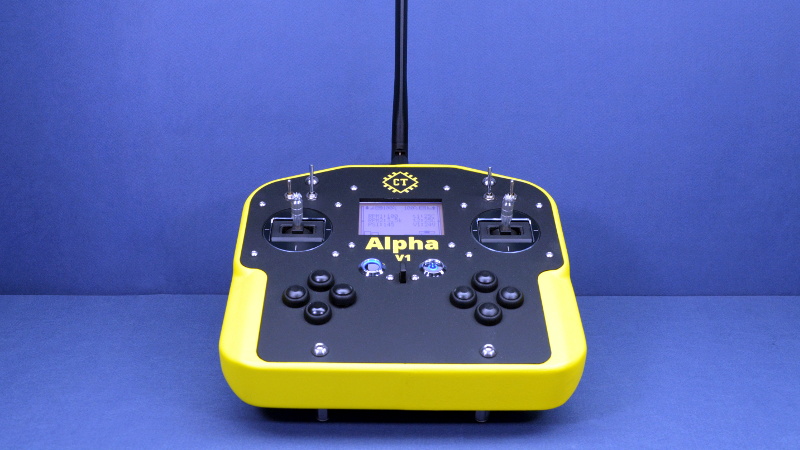While we’ve come a long way in terms of opening up the world of radio control to open source software, a good deal of the hardware itself is still closed up. You can flash a cheap RC transmitter with a community developed firmware, in fact there’s a decent chance that’s what it ships with, but the hardware itself is still an immutable black box. That might be fine if you’re just flying an RC plane or quadcopter, but what if you’ve got something a bit more advanced in mind?

To address this issue, [Alireza Safdari] has spent the last several years working on a truly open source RC transmitter that can be modified and augmented to meet the user’s needs, called the Alpha V1. With the hardware and software nearing completion, he’s looking to get some community feedback on the system before the planned crowdfunding campaign kicks off.
From his personal experience, [Alireza] found that traditional RC transmitters have their limits when you start using them for robotics. You’ll often want input schemes or devices which would never occur to the remote’s designers, and you’ll almost certainly want to have more channels and functions than the original hardware will allow. One of the big advantages with the Alpha V1 is that the front and back of the controller are simple acrylic panels, meaning you can easily cut openings or drill holes in them to add more hardware without having to deal with the (relatively) ergonomic shapes of a traditional transmitter.
Of course, that’s only one half of the equation. When you add new hardware, you’ll need to make the software aware of it. To that end, [Alireza] says he and his team have developed a library of adaptable firmware modules which should make it very easy to add in new components without having to get bogged down with software configuration. In fact, he says the goal is to allow the user to add new hardware to the Alpha V1 without requiring them to write a single line of code.
The Alpha V1 communicates at 2.4 GHz using either XBee or Murata DNT24 radios, and supports as many as 72 individual channels as well as two-way telemetry. If your requirements aren’t quite so high, we recently covered a significantly less intimidating attempt at building an open source RC transmitter that might suit your needs.
















This also dovetails with adaptive technologies for people who need different physical controls.
Being able to make a new input device, and drop it seamlessly into an existing electronics/software stack, lowers the bar for a lot of would-be-adapters. Very cool!
As a R/C enthusiast who suffered a C6 SCI, this is a great idea. It could allow those with limited bodily mobility to participate in R/C as well as a great number of other activities.
To be honest we never thought of Alpha V1 in this way; but we are glad you brought it up. It would be our honor to see Alpha V1 helping people with mobility impairments. We work our hardest to bring Alpha V1 to market as soon as possible.
Thank you Nate. We are glad you liked it.
Based on an Arduino Nano? Somewhat surprising, since other RC projects have long since moved to 32-bit processors to handle all the functionality they incorporate. I’m referring to Er9x, OpenTX, and DeviationTX.
It is actually going to be based on Arduino Mega.
We have spent many hours to pick the most suitable Arduino board for Alpha V1 and we picked Mega. We considered majority of potential Alpha V1 users in decision making and tried not to include our personal preferences.
The following reasons motivated us to go forward with Arduino Mega:
1) Large Number of I/Os (the only competitor without the need of I/O expander would be Arduino Due)
2) Better community support for new users
3) More forgiving if users make mistakes in customization process (compare to other ARM based Arduinos)
4) 5 Volt as its operation voltage (many old devices may not operate with 3.3V)
This choice did not make our lives easy because we faced many challenges to make sure Arduino Mega can manage all the tasks considering its low processing power, but we think this is going to benefit majority of Alpha V1 users.
We have considered making an ARM based version for pro users in future, but at this point it is too early to make that promise.
openTX and 32 channels on an arduino mega might be another option, the case is an interesting aspect, expandability and ergonomics, that area is very opinionized.
openTX has dropped support for Arduino Mega, but this was never our motivation going forward with Alpha V1.
Alpha V1 is not another RC Transmitter (Open/Closed source). It is an open source remote controller that let you customize it easily. We have also made it easy to attach many different input devices to the remote controller, by both reducing the mechanical difficulties and also providing code-free support for various analog and digital input devices.
“Open source radio control transmitter”
ask owner for link to code.
“At this point the source code is held private…”
It would be great if you could include our complete response:
“At this point the source code is held private, but at the right time everything will become public and open source.”
“Do let me know if you have a particular question or if you are interested in a specific part of the project, we may be able to help.”
We have plans to launch a crowdfunding campaign and we would like to honor our backers by making sure they are the first users and owners of Alpha V1. In order to guarantee that, we should make sure the source code remain private at this time.
Also, as mentioned in our previous response, we may be able to help if you provide us with more information.
Is it possibly to at some small switches, on one channel to use for a multiswitch channel for switching items in a model (Truck model)